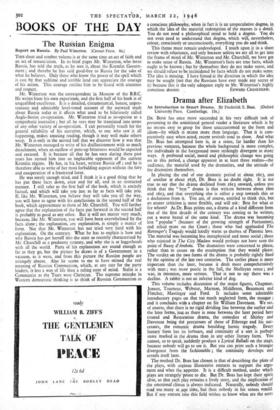BOOKS OF THE DAY
The Rug'sian Enigma
Report on Russia. By Paul Winterton. (Cresset Press. 6s.) THIS short and sombre volume is at the same time an act of faith and an act of renunciation. In its brief pages Mr. Winterton, who loves Russia, has told the truth, as he sees it, about the Kremlin Govern- ment ; and thereby he has said good-bye to Russia for the sake of what he believes. Only those who know the power of the spell which is cast by that sublime and terrible land can appreciate the courage of his action. This courage entitles him to be heard with attention and respect.
Mr. Winterton was the correspondent in Moscow of the B.B.C. He writes from his own experience, and the first half of his book is of unqualified excellence. It is a detailed, circumstantial, honest, unpre- tentious and admirably level-toned account of the outward truth about Russia today as it affects what used to be hilariously called Anglo-Soviet co-operation. Mr. Winterton tried to co-operate as a sympathetic journalist ; but all he says may be translated into terms of any other variety of co-operation. I can personally vouch for the general reliability of his narrative, which, to one who saw it all happening, makes amusing reading, though it may well make others weep. It is only in the second half that we discover how it was that Mr. Winterton managed to write of his disillusionment with so much detachment, when an outflow of pent-up bitterness would be expected and excused. It is because all that he has seen during these past years has turned him into an implacable opponent of the current Kremlin regime. He has, in his heart, written Russia off ; and he is therefore able to write of her most forbidding aspects without the fury and exasperation of a frustrated lover. He was sorely enough tried, and I think it is a good thing that he has put these facts down, once and for all, and in an instructed manner. I still refer to the first half of the book, which is entirely factual, and which will take you just as far as facts will take you. If, like Mr. Winterton, you believe they will take you all the way, you will have to agree with his conclusions in the second half -of the book, which approximate to thoge of Mr. Churchill. You will further agree that the explanation of the facts put forward in the second half is probably as good as any other. But it will not matter very much, because, like Mr. Winterton, you will have been overwhelmed by the facts alone ; the explanation, any explanation, is simply a matter of form. Not that Mr. Winterton has not tried very hard with his explanation. On the contrary. What he has to explain is how and why Russia has got herself into the state so recently characterised by Mr. Churchill as a predatory tyranny, and why she is at loggerheads with all the world. Parts of his explanation are sound enough as far as they go, but the picture he draws is of a Government in a vacuum, as it were, and from this picture the Russian people are strangely absent. Also he scents to me to have missed the real meaning of Russian Communism, which, at any rate for the party leaders, is less a way of life than a ruling state of mind. Stalin is a Communist as the Tsars were -Christian. The supreme mistake in Western democratic thinking is to think of Russian Communism as a conscious philosophy, when in- fact it is an unspeculative dogma, in which the idea of the material redemption of the masses is a detail. You do not need a philosophical mind to hold a dogma. You do not even need to understand that dogma, which will, nevertheless, colour, consciously or unconsciously, everything you do and think.
This theme must remain undeveloped. I touch upon it in a short review with reluctance, and only because unless we are all to get into the frame of mind of Mr. Winterton and Mr. Churchill, we have got to make sense of Russia. Mr. Winterton's facts are true facts, which ought to be known ; but by.themselves they do not make sense, and we shbuld refuse to be intimidated by facts which do not make sense. The idea is missing. I have hinted at the direction in which the idea may be sought (not that the Russians have ever made any secret of it) because this is the only adequate reply to Mr. Winterton's highly






























 Previous page
Previous page